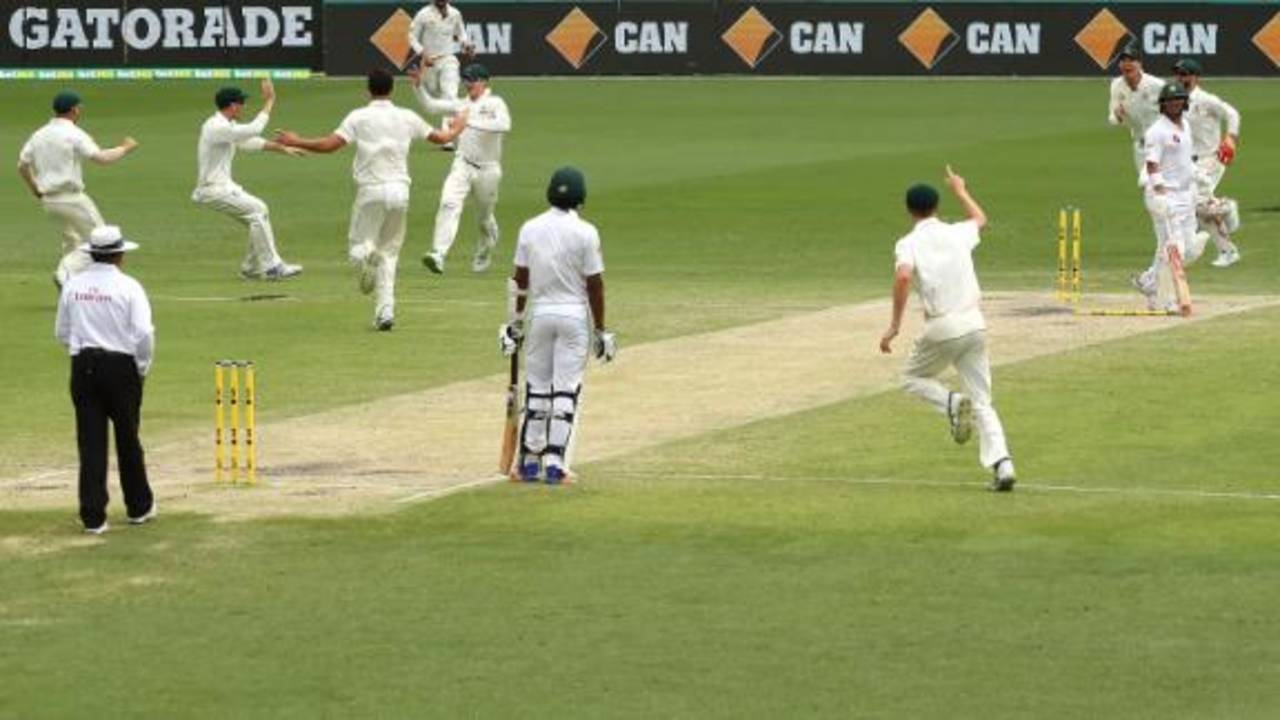Confusion between Smith and umpires led to extra time
Ian Gould and Richard Illingworth thought Australia wanted to bowl Pakistan out on the fourth day based on an earlier conversation they had with Steven Smith
Brydon Coverdale at the Gabba
19-Dec-2016
A breakdown in communication between the umpires and Australia captain Steven Smith has emerged as the reason an extra eight overs were bowled on the fourth evening at the Gabba. Smith has confirmed that his preference was to finish play at the scheduled stumps time to allow his bowlers a chance to recover, but the umpires allocated extra time based on an earlier conversation with Smith.
The ICC's Test match playing condition 16.2.1 states that "the umpires may decide to play an extra 30 minutes (a minimum of eight overs) extra time at the end of any day (other than the last day) if requested by either captain, if in the umpire's opinion, it would bring about a definite result on that day". However, Smith said he did not officially request the extra time from umpires Ian Gould and Richard Illingworth.
The ICC said in a statement on Monday evening that: "The umpires believed they were acting on a request from Steve Smith, based on a conversation with him about the granting of extra time a few overs before the scheduled end of play. It is the umpires' decision as to whether to agree to the request, and the guide for umpires is that a team should be at least seven wickets down before such a request should be granted."
Pakistan were seven wickets down at the scheduled stumps time of 9.30pm, which was already 90 minutes later than usual due to rain earlier in the day.
"Early on in the day, I sort of said 'it's great that we have that extra half hour up our sleeve if we need it'," Smith said after the match. "And then later on, Gunner Gould was pretty adamant that he wanted to sort of stay out there and try and get the game over and done with.
"The umpires deemed for it to be an opportunity of a result. We went with that. I probably, at that point of time, would have liked to come off and given our bowlers a rest - they'd worked incredibly hard all day and Pakistan were just starting to get onto a bit of a roll and looked quite comfortable.
"I would've liked to have come off. But you've got to go with the umpire's call. It's their decision out on the ground, and they decided to stay out there."

'The umpires believed they were acting on a request from Steve Smith, based on a conversation with him about the granting of extra time a few overs before the scheduled end of play' - ICC•AFP
It was believed the confusion arose from a conversation between Smith and the umpires with approximately six overs left in the day's play, during which Smith asked the umpires what the situation was with the extra time. The umpires replied that the guidelines were that extra time would be granted if the batting team was seven wickets down. Smith replied to the effect that Australia had already achieved that.
Then, at the scheduled stumps time, Smith moved towards slip, assuming that the decision rested with the umpires, while the umpires saw this as confirmation that Smith wanted the extra time. No conversation took place at 9.30pm as to whether Smith, in fact, did want the extra eight overs to which he was entitled.
The extra time had the potential to significantly alter the outcome of the Test, for Australia had taken only one wicket in the preceding 27 overs. Their bowlers were tiring, and Pakistan's batsmen were well set. In the end, Pakistan added 51 valuable runs during the extra eight overs, although they lost a wicket in the final one before stumps was finally called at 10.09pm.
Pakistan's captain Misbah-ul-Haq said although the runs were useful in his team's push for what would have been a world record Test chase of 490 had they achieved it, the decision to play extra time did concern him.
"It was a bit of both. Everybody believed that after watching day and night Test cricket, especially in Brisbane, that the most difficult time to bat is under lights," Misbah said. "We were a bit concerned but at the same time we were a bit relaxed because at that time, when they took the extra half hour, their main bowler [Mitchell] Starc just finished a spell.
"We were just hoping that now he's not bowling and from one side maybe they have to bowl [Nathan] Lyon and there's a bit of moisture in the ground, so it might not swing and turn that much. I thought if we could add another 40 runs it would help us the next morning. That exactly worked for us. That could have gone either way, but we got 50-something runs in that session and that just got us a bit closer."
Wahab Riaz, who was batting with Asad Shafiq when the extra time was called, said he was happy with the decision because the conditions were good for batting.
"I was not expecting it, but then when the umpire said that we have a half-hour extension, I felt it was good because the ball was coming onto the bat really nicely and Asad was playing really well as well, so I wanted him to score his century last night," Wahab said on ABC radio on Monday morning. "Coming up today it was going to be a different atmosphere."
Brydon Coverdale is an assistant editor at ESPNcricinfo. @brydoncoverdale
